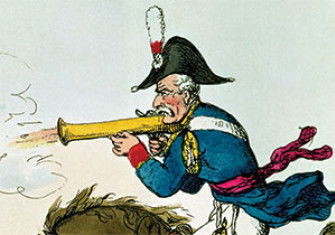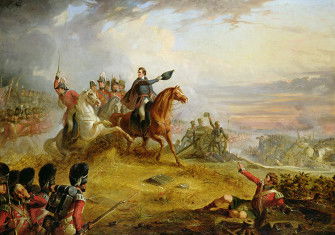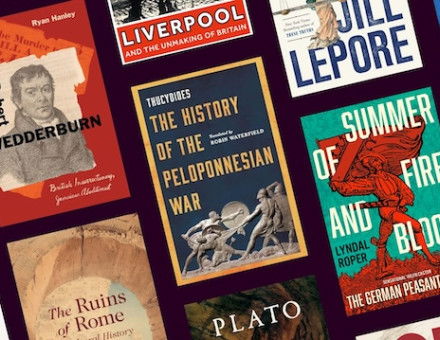Waterloo in Fiction: A Tale of Two Sharp(e)s
Literary responses to the battle help us understand its place in cultural memory.
This summer marked the 200th anniversary of the Battle of Waterloo and in discussions of memory 200 years is an interesting amount of time. It falls outside the 'saeculum', the span of living memory. According to the historian Alan Forrest, the last British witness of Waterloo died in 1905: in 1815 she had been the five-year-old daughter of a camp follower. Beyond the saeculum lies 'historical time': archives and memorials to be explored by historians. This 'historical time' becomes, simultaneously, 'fabulous time', for novelists and film-makers to plunder for fables, stories and settings, from the historical novels of Sir Walter Scott to Shakespeare in Love. As the events recede further into the past, the 'historical' struggles against the 'fabulous'. Waterloo is just at the cusp of this struggle, poised between the 'historical' and the 'fabulous', though the fictions it inspired tell us a great deal about the memory of the battle today.
One fabulous – in both senses – occasion was the Duchess of Richmond's Ball, held before the battle and over the past 200 years numerous fictional characters have been added to the extensive guest list. Two of these are currently the most famous fictional characters from Waterloo. Both tell us about how the battle is remembered in 2015: oddly, both have the same-sounding surname.
The first is the grim soldier Lieutenant-Colonel Richard Sharpe, from Bernard Cornwell's hugely successful and meticulously researched novels. Played memorably on television by Sean Bean, Sharpe has dark hair (until Cornwell changed it to match Bean's), a sharp eye for combat, a sharp tongue and, before a battle, his ungainly sword is ritually sharpened to a razor-like edge. In Sharpe's Waterloo (1990) he attends the ball dressed in his talismanic combat-worn green Rifleman's jacket, carrying crucial information for the Duke. He also has business of honour with the cavalry officer who has seduced his wife.
The other important fictional guest looks, at first sight, utterly the opposite of Richard Sharpe. Rebecca Sharp is the scheming force of nature at the centre of William Makepeace Thackeray's 'novel without a hero', Vanity Fair, from 1847-48. Becky has a sharp sense of the injustices done to her: she has a sharp wit and sharper financial sense and she uses these to cut her way into society. When she attends the ball, with her black hair in ringlets, her face is 'radiant', 'her dress perfection'. She charms (nearly) everyone in the ballroom and dishonourably dances with another's husband.
These two apparent opposites, one from a canonical novel, the other from genre fiction, share more than a name. Their stories and social trajectories are the same: both are social climbers. In Sharpe's Regiment (1986), it is revealed that Sharpe's mother is a 'whore' from the St Giles rookery, next to Covent Garden, where he grew up. Born (probably) in 1777, Richard has no idea who his father is. Becky Sharp's mother is a far from respectable 'opera girl' and her father was a dissolute artist who lived in Soho, where Becky lived until she was sent to school. Richard Sharpe's ascension through the ranks, promoted for his heroism, parallels Becky Sharp's promotion through the class structure: she is the victor – Thackeray uses explicit military metaphors for Becky's campaigns – of different sorts of battles. Both make advances, retreats and captures: Richard's sallies and feints are on the field, Becky's in the drawing room. In this way, both oddly echo Napoleon's meteoric social rise, too, and the wider concerns about status at the time. Indeed, the two Sharp(e)s show how the memory of Waterloo is inextricably entwined with issues of class, money and status, more, perhaps, than heroism and courage: and, of course, Napoleon as the prime example of the 'self-made man' looms large over this memory.
Richard and Becky have similar personalities. Both are angry: Richard Sharpe is furious at the incompetence of the officer class with their bought commissions and at the endless slights done to him as a commoner. Becky, too, is angry at the way she is condescended to and shipped off to be 'only' a governess. Both fight: Richard, while undisciplined, is a superb tactician; Becky, too, has acute insights into the ambitions and desires (and so strengths and weaknesses) of those around her. This individuality, too, is emblematic of the memory of Waterloo, which is remembered, for all its terrible slaughter, as a battle on the cusp of the industrial period, where individual or communal acts of heroism, or the insights of a commander, can be imagined to change the outcome.
Could the two Sharp(e)s be related? Vanity Fair makes clear that Becky's father 'owed money for a mile round' Soho, so might easily have known Sharpe's mother in Covent Garden and, in 1776, might have become the father of little Richard (his mother died in the Gordon riots of 1780). As we have seen, the two Sharp(e)s share more than just dark hair. Perhaps at the ball their eyes met and they recognised in each other a similar rage, an ambition, a tactical mind of genius? Or perhaps he thought her a vain young woman and she thought him a scruffy rogue?
There is much more to this than mere literary speculation. Their different spheres tell us something about how Waterloo itself is remembered. As Judith Hawley points out, Thackeray drew heavily on Frances Burney's Waterloo diaries for his novel; Cornwell's well-researched work, too, draws on the accounts of witnesses. Both writers represent different aspects of the battle: the military and the domestic. For the First and Second World Wars, the 'Home Front' is as much part of what we remember as the military campaigns: but for Wellington's time, the military and the domestic were, almost for the last time, separate. The impact of Britain's overseas wars – in Europe or in the rest of the world – in the 18th and 19th century, so important to the nation and its global history, are poorly understood in their British context and often poorly remembered. (Salman Rushdie – another literary inheritor of Thackeray – has a character called 'Whiskey' Sisodia who says, stuttering: 'The trouble with the English is that their hiss hiss history happened overseas so they dodo don't' know what it means'.) The division between the two Sharp(e)s – and our shared cultural memory of Waterloo – is an acute case in point.
Robert Eaglestone is Professor of Contemporary Literature and Thought at Royal Holloway, University of London.






